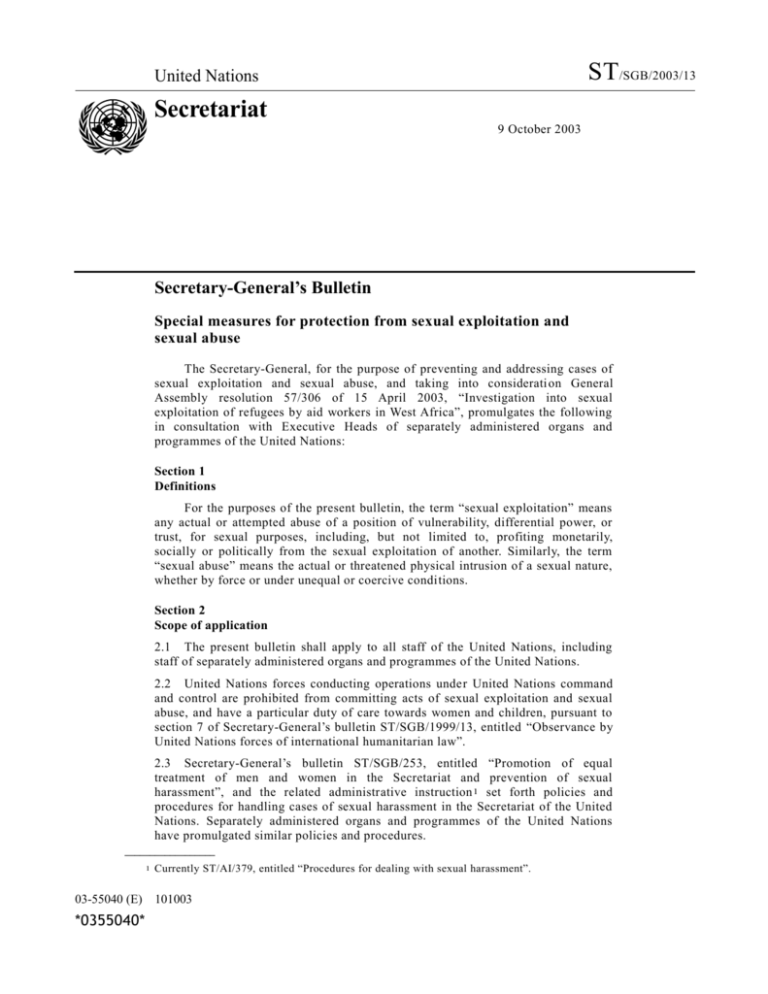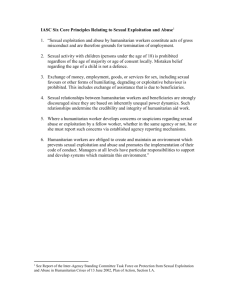
ST/SGB/2003/13
United Nations
Secretariat
9 October 2003
Secretary-General’s Bulletin
Special measures for protection from sexual exploitation and
sexual abuse
The Secretary-General, for the purpose of preventing and addressing cases of
sexual exploitation and sexual abuse, and taking into considerati on General
Assembly resolution 57/306 of 15 April 2003, “Investigation into sexual
exploitation of refugees by aid workers in West Africa”, promulgates the following
in consultation with Executive Heads of separately administered organs and
programmes of the United Nations:
Section 1
Definitions
For the purposes of the present bulletin, the term “sexual exploitation” means
any actual or attempted abuse of a position of vulnerability, differential power, or
trust, for sexual purposes, including, but not limited to, profiting monetarily,
socially or politically from the sexual exploitation of another. Similarly, the term
“sexual abuse” means the actual or threatened physical intrusion of a sexual nature,
whether by force or under unequal or coercive conditions.
Section 2
Scope of application
2.1 The present bulletin shall apply to all staff of the United Nations, including
staff of separately administered organs and programmes of the United Nations.
2.2 United Nations forces conducting operations under United Nations command
and control are prohibited from committing acts of sexual exploitation and sexual
abuse, and have a particular duty of care towards women and children, pursuant to
section 7 of Secretary-General’s bulletin ST/SGB/1999/13, entitled “Observance by
United Nations forces of international humanitarian law”.
2.3 Secretary-General’s bulletin ST/SGB/253, entitled “Promotion of equal
treatment of men and women in the Secretariat and prevention of sexual
harassment”, and the related administrative instruction 1 set forth policies and
procedures for handling cases of sexual harassment in the Secretariat of the United
Nations. Separately administered organs and programmes of the United Nations
have promulgated similar policies and procedures.
__________________
1
Currently ST/AI/379, entitled “Procedures for dealing with sexual harassment”.
03-55040 (E) 101003
*0355040*
ST/SGB/2003/13
Section 3
Prohibition of sexual exploitation and sexual abuse
3.1 Sexual exploitation and sexual abuse violate universally recognized
international legal norms and standards and have always been unacceptable
behaviour and prohibited conduct for United Nations staff. Such conduct is
prohibited by the United Nations Staff Regulations and Rules.
3.2 In order to further protect the most vulnerable populations, especially women
and children, the following specific standards which reiterate existing general
obligations under the United Nations Staff Regulations and Rules, are promulgated:
(a) Sexual exploitation and sexual abuse constitute acts of serious misconduct
and are therefore grounds for disciplinary measures, including summary dismissal;
(b) Sexual activity with children (persons under the age of 18) is prohibited
regardless of the age of majority or age of consent locally. Mistaken belief in the
age of a child is not a defence;
(c) Exchange of money, employment, goods or services for sex, including
sexual favours or other forms of humiliating, degrading or exploitative behaviour, is
prohibited. This includes any exchange of assistance that is due to beneficiaries of
assistance;
(d) Sexual relationships between United Nations staff and beneficiaries of
assistance, since they are based on inherently unequal power dynamics, undermine
the credibility and integrity of the work of the United Nations and are strongly
discouraged;
(e) Where a United Nations staff member develops concerns or suspicions
regarding sexual exploitation or sexual abuse by a fellow worker, whether in the
same agency or not and whether or not within the United Nations system, he or she
must report such concerns via established reporting mechanisms;
(f) United Nations staff are obliged to create and maintain an environment
that prevents sexual exploitation and sexual abuse. Managers at all levels have a
particular responsibility to support and develop systems that maintain this
environment.
3.3 The standards set out above are not intended to be an exhaustive list. Other
types of sexually exploitive or sexually abusive behaviour may be grounds for
administrative action or disciplinary measures, including summary dismissal,
pursuant to the United Nations Staff Regulations and Rules.
Section 4
Duties of Heads of Departments, Offices and Missions
4.1 The Head of Department, Office or Mission, as appropriate, shall be responsible
for creating and maintaining an environment that prevents sexual exploitation and
sexual abuse, and shall take appropriate measures for this purpose. In particular, the
Head of Department, Office or Mission shall inform his or her staff of the contents of
the present bulletin and ascertain that each staff member receives a copy thereof.
4.2 The Head of Department, Office or Mission shall be responsible for taking
appropriate action in cases where there is reason to believe that any of the standards
listed in section 3.2 above have been violated or any behaviour referred to in section
2
ST/SGB/2003/13
3.3 above has occurred. This action shall be taken in accordance with established
rules and procedures for dealing with cases of staff misconduct.
4.3 The Head of Department, Office or Mission shall appoint an official, at a
sufficiently high level, to serve as a focal point for receivin g reports on cases of
sexual exploitation and sexual abuse. With respect to Missions, the staff of the
Mission and the local population shall be properly informed of the existence and
role of the focal point and of how to contact him or her. All reports of sexual
exploitation and sexual abuse shall be handled in a confidential manner in order to
protect the rights of all involved. However, such reports may be used, where
necessary, for action taken pursuant to section 4.2 above.
4.4 The Head of Department, Office or Mission shall not apply the standard
prescribed in section 3.2 (b), where a staff member is legally married to someone
under the age of 18 but over the age of majority or consent in their country of
citizenship.
4.5 The Head of Department, Office or Mission may use his or her discretion in
applying the standard prescribed in section 3.2 (d), where beneficiaries of assistance
are over the age of 18 and the circumstances of the case justify an exception.
4.6 The Head of Department, Office or Mission shall promptly inform the
Department of Management of its investigations into cases of sexual exploitation
and sexual abuse, and the actions it has taken as a result of such investigations.
Section 5
Referral to national authorities
If, after proper investigation, there is evidence to support allegations of sexual
exploitation or sexual abuse, these cases may, upon consultation with the Office of
Legal Affairs, be referred to national authorities for criminal prosecution.
Section 6
Cooperative arrangements with non-United Nations entities or individuals
6.1 When entering into cooperative arrangements with non-United Nations entities
or individuals, relevant United Nations officials shall inform those entities or
individuals of the standards of conduct listed in section 3, and shall receive a written
undertaking from those entities or individuals that they accept these standards.
6.2 The failure of those entities or individuals to take preventive measures against
sexual exploitation or sexual abuse, to investigate allegations thereof, or to take
corrective action when sexual exploitation or sexual abuse has occurred, shall
constitute grounds for termination of any cooperative arrangement with the United
Nations.
Section 7
Entry into force
The present bulletin shall enter into force on 15 October 2003.
(Signed) Kofi A. Annan
Secretary-General
3







